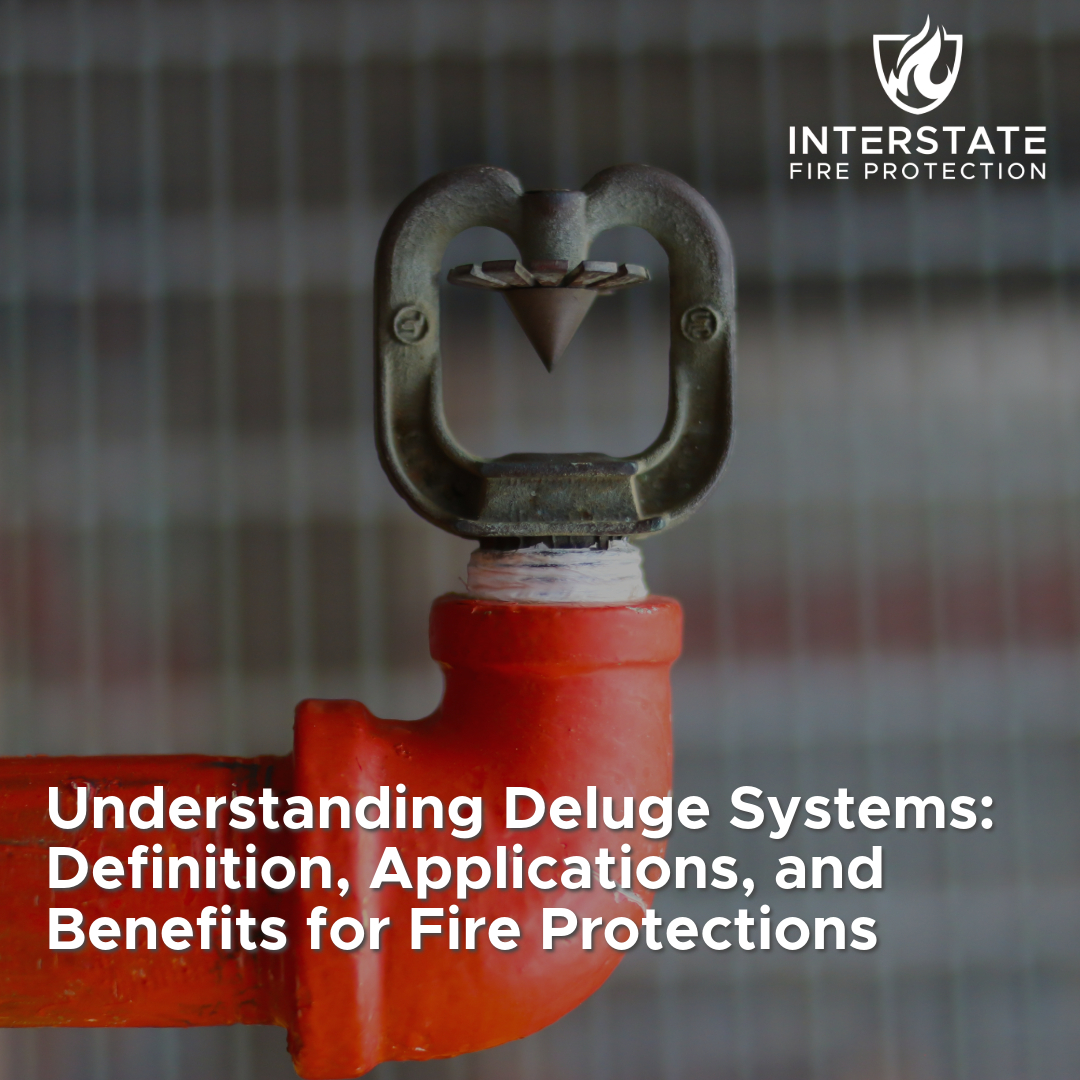
When it comes to fire protection in high-risk environments, deluge systems stand out as one of the most effective solutions. Designed to deliver a rapid and large-scale response, these systems are tailored for environments where the risk of fire is exceptionally high and the consequences of a delayed response could be catastrophic. From chemical storage facilities to aircraft hangars, understanding deluge systems for fire protection is critical for safeguarding assets, operations, and lives.
What Are Deluge Systems?
Deluge systems are a specialized type of fire sprinkler system designed to release a large quantity of water over a specific area rapidly. Unlike traditional sprinkler systems, where individual sprinkler heads activate based on heat detection, deluge systems release water through all nozzles simultaneously when triggered. This immediate response helps to suppress fires before they can spread, making them ideal for environments with highly flammable materials or open spaces where rapid fire spread is a significant concern.
How Do Deluge Systems Work?
Deluge systems are composed of several key components that work in unison to deliver their rapid response:
- Open Nozzles – Unlike standard sprinkler heads, the nozzles in a deluge system are always open. This design ensures that water is distributed across the entire protected area when the system is activated.
- Deluge Valve – The deluge valve acts as the system’s control center. When a fire is detected, the valve opens, allowing water to flow through the piping and out of the nozzles.
- Fire Detection System – Sensors, such as heat or smoke detectors, monitor the environment for signs of fire. When these sensors are triggered, they signal the deluge valve to open.
- Water Supply – A high-capacity water source ensures that the system can deliver a large volume of water quickly and efficiently.
When a fire is detected, the sensors communicate with the deluge valve to release water immediately, covering the entire area and preventing the fire from escalating. This design ensures a faster and more comprehensive response compared to traditional sprinkler systems.
Applications of Deluge Systems
Deluge systems are particularly valuable in environments where the risk of fire is both high and potentially devastating. Common applications include:
- Industrial Facilities – Factories and warehouses often handle flammable materials, making them prime candidates for deluge systems. The ability to suppress fires quickly helps protect workers, equipment, and products.
- Chemical Storage Facilities – In locations where volatile chemicals are stored, a deluge system can prevent a fire from escalating into an explosion, minimizing the risk to nearby communities.
- Aircraft Hangars – The large, open spaces in hangars require a system capable of rapid water distribution to control fires before they can spread to aircraft and fuel supplies.
- Power Plants – Facilities generating electricity often house high-voltage equipment and combustible materials, necessitating the robust protection offered by deluge systems.
- Transportation Infrastructure – Tunnels and transit hubs can benefit from deluge systems, ensuring that fires are contained in crowded or enclosed spaces.
Benefits of Deluge Systems
The effectiveness of deluge systems lies in their unique design and operational capabilities. Here are the key benefits they offer:
- Rapid Fire Suppression – By delivering water through all nozzles simultaneously, deluge systems minimize the time it takes to suppress a fire, reducing damage and preventing spread.
- Comprehensive Coverage – The open-nozzle design ensures that water is distributed evenly across the entire area, making it ideal for large spaces or areas with high fire loads.
- Customizable Design – Deluge systems can be tailored to meet the specific risks of a facility. For example, foam or chemical agents can be integrated into the system for specialized fire suppression.
- Enhanced Safety – These systems provide an extra layer of protection in high-hazard environments, ensuring the safety of employees and assets.
- Regulatory Compliance – Many industries require facilities to have fire suppression systems that meet stringent safety standards. Deluge systems often exceed these requirements, helping businesses avoid fines and legal issues.
Maintaining Your Deluge System
As with any fire protection system, regular maintenance is essential to ensure functionality and compliance. Here’s how you can keep your deluge system in optimal condition:
- Routine Inspections – Schedule regular inspections to check for wear, corrosion, or blockages in the piping and nozzles.
- Testing Sensors and Valves – Ensure that heat and smoke detectors are functioning correctly and that the deluge valve opens and closes as expected.
- Flush the System – Periodically flush the system to remove debris or sediment that could impede water flow.
- Upgrade Components – If your facility’s needs have changed, consider upgrading components or adding foam and chemical suppression capabilities.
At Interstate Fire, we provide comprehensive maintenance services to keep your deluge system operational and compliant with NFPA standards.
Why Work with Interstate Fire?
With decades of experience in fire protection, Interstate Fire is your trusted partner for designing, installing, and maintaining deluge systems. Our team of experts works closely with businesses to develop tailored fire suppression strategies that address unique risks and requirements. Whether you’re safeguarding a chemical storage facility or an aircraft hangar, we’re here to ensure your deluge system delivers when it matters most.
Safeguard Your Facility with a Deluge System
Investing in a deluge system is an investment in safety, compliance, and peace of mind. By choosing Interstate Fire, you’ll receive not only cutting-edge technology but also the expertise and support needed to keep your system running smoothly. Don’t wait for a fire to test your preparedness—contact us today to learn more about deluge systems and how they can protect your facility.